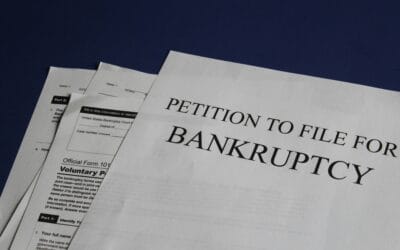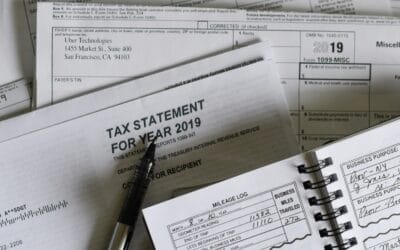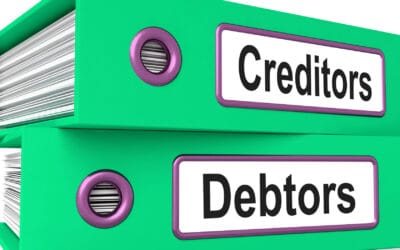Bankruptcy's Effect on Your Credit Score: Insights to Consider
Bankruptcy is a legal process designed to help individuals regain financial stability while affecting your credit score. This article explains how bankruptcy impacts your credit ratingover time, reviews different bankruptcy types and their consequences, and presents strategies for rebuilding your credit. As an experienced bankruptcy lawyer at Moody Law Offices, I am here to guide you through the decisions you will face.
Understand How Bankruptcy Impacts Your Credit RatingOver Time
Analyze the Immediate Effects of Bankruptcy on Your Credit Score
Filing for bankruptcy causes an immediate and significant drop in your credit score—often 100 points or more—as major creditbureaus update your report to reflect the filing. Creditscoring models penalize bankruptcies because they signal financial distress and an inability to meet obligations. Lenders react by imposing higher interestrates or denying credit, making it important to avoid new creditapplications while you adjust to this change.
Explore Short-Term Credit ScoreChanges After Filing for Bankruptcy
In the short term, your credit scoreremains low and creditors remain cautious. Bankruptcy stays on your creditreport for seven to ten years, but its strongest impact is felt in the first two years post-filing. During this period, even small financial decisions can significantly affect your score. Maintaining a record of on-time payments and low creditutilization is essential for making gradual improvements.
Examine Long-Term Credit ScoreRecovery Post-Bankruptcy
Long-term recovery is achievable through disciplined financial behavior. Although bankruptcy may remain on your report for up to 10 years, its negative effect diminishes if you consistently pay bills on time, reduce debtlevels, and monitor your creditreport for errors. Over five to seven years, many individuals rebuild their creditenough to qualify for better loanterms, thanks in part to strategies such as using secured credit cardsand installment loans.
Evaluate CreditReport Entries Related to Bankruptcy Filing
Creditreport entries during bankruptcy are detailed and include the chapter filed, filing dates, and discharged debts. Lenders scrutinize these details when reviewing your history, which is why accuracy is crucial. Disputing inaccuracies with creditagencies and ensuring correct reporting can help mitigate the long-term impact on your score.
Consider Variations in Impact Based on Bankruptcy Chapter Type
Different bankruptcy chapters affect creditscores differently. Chapter 7, which involves liquidation of assets to discharge debt, tends to have a larger immediate impact and remains on your report for about 10 years. Chapter 13, which restructures debtinto a repayment planwhile allowing you to keep most assets, generally has a milder long-term effect and is removed after approximately seven years. Both require strict adherence to repayment plans, but Chapter 13 may be viewed more favorably by lenders over time.
Identify Other Financial Factors That Influence Your Credit
Besides the bankruptcy filingitself, other factors influence your credit score. Payment history, creditutilization, and the variety and length of your creditaccounts all play roles. Post-bankruptcy, a history of timely payments and lower debtbalances help offset the negative record. Additionally, managing incomefluctuations, employment changes, and unexpected expenses through consistent budgeting and credit counselingcan further stabilize your credit.
Learn About Different Bankruptcy Types and Their Consequences
Distinguish Between Chapter 7 and Chapter 13 Bankruptcy
Chapter 7 bankruptcy involves liquidating non-exempt assets to discharge most unsecured debts, offering a quick fresh start but often at the cost of asset loss and a longer creditreport presence (up to 10 years). In contrast, Chapter 13 reorganizes debtsinto a repayment planspanning three to five years while allowing you to keep your property; it is removed from your report after about seven years. Your choice depends on your asset situation and long-term financial goals.
Assess Which Bankruptcy Type Affects CreditScores Differently
The immediate drop in credit scoreis often steeper for Chapter 7 due to its finality and asset liquidation, while Chapter 13 may show a somewhat smoother creditrecovery if the repayment planis followed diligently. Creditors sometimes view Chapter 13 as evidence of a structured, active effort to resolve debtissues, which can improve long-term rating recovery.
Review How Each Type Influences DebtRepayment Options
Chapter 7 offers immediate discharge of unsecured debtslike credit cardsand personal loans, but may require the sale of non-exempt assets. Conversely, Chapter 13 consolidates debtinto manageable payments that protect essential assets such as your home or car. Your eligibility and the mix of debtsyou hold determine which option best supports your overall financial recovery.
Understand the Duration of Bankruptcy's Impact on Your Score
A Chapter 7 bankruptcy remains on your creditreport for about 10 years and Chapter 13 for around seven years, though their most damaging effects occur in the first couple of years. With ongoing financial discipline—such as timely payments and reduced creditutilization—the long-term impact weakens, allowing your credit scoreto gradually improve even while the bankruptcy notation is still visible.
Investigate Regional Differences in Bankruptcy Laws
While federal bankruptcy law provides a general framework, state-specific exemptions and thresholds can influence the outcome of your case. In states with more generous exemptions, you may retain more assets during a Chapter 7 process, which can help stabilize your financial situation and aid creditrecovery. Consulting a local bankruptcy attorney can clarify how regional laws affect your case and creditprospects.
Analyze the Decision-Making Process for Choosing Bankruptcy
Choosing to file for bankruptcy requires careful assessment of your current debt, income, and long-term financial objectives. Beyond credit scoreconsiderations, factors such as asset protection and emotional stress reduction play key roles. A professional bankruptcy attorney can help evaluate whether Chapter 7 or Chapter 13 better suits your circumstances, offering a detailed consultation that balances immediate relief with long-term creditimpacts.
Discover Strategies to Rebuild Your CreditAfter Bankruptcy
Implement Smart Financial Habits for CreditRestoration
Rebuilding your creditbegins with establishing disciplined financial habits. Start by creating a budgetthat prioritizes essential expenses and scheduled debtrepayments. Ensuring that every bill—from utilities to secured credit cards—is paid on time is critical since payment history accounts for a significant portion of your credit score. Keep creditutilization below 30% to demonstrate responsible creditbehavior.
Monitor Your CreditReport for Errors and Inaccuracies
Regularly review your creditreport obtained from Equifax, Experian, and TransUnionto ensure accuracy. Errors such as duplicated bankruptcy entries or incorrect discharge dates can harm your score. Promptly disputing any inaccuracies helps ensure that your creditreport accurately reflects your recovery progress.
Utilize Secured Credit Cardsto Re-Establish Creditworthiness
Secured credit cardsare valuable tools for rebuilding credit. They require a cashdeposit as collateral, which minimizes the lender’s riskand allows you to demonstrate responsible borrowing. Use these cards for small, necessary purchases and pay off the balance in full each month. Over time, as your positive payment history grows, you may qualify for an unsecured card and improved creditlimits.
Balance Debtsand Make Timely Payments for Better Scores
Avoid piling on new debtafter bankruptcy by carefully managing existing obligations. Consider consolidating remaining debtsinto a single, manageable repayment plan. Adhere to this plan and make timely payments, as the consistency of your repayment efforts significantly influences your credit scoreand reassures future lenders of your financial reliability.
Develop a BudgetThat Supports Financial Stability
A well-organized budgetis vital to avoiding future financial crises. Categorize your expenses—including housing, food, transportation, and debtpayments—and allocate incometowards savings. Budgeting tools and apps can assist in tracking expenses and identifying areas for cost reduction. A stable budgetnot only improves your credit scorebut also helps prevent overspending in the future.
Consider Credit CounselingServices for Guidance
Credit counselingagencies offer expert advice and personalized strategies for managing debtand rebuilding credit. In a counseling session, professionals help you understand your creditreport, establish a responsible spending plan, and create a structured payment schedule. Their guidance can be especially beneficial if you feel overwhelmed by your financial situation, offering tailored advice to restore your credithealth.
List of Key Actions to Rebuild CreditPost-Bankruptcy
- Establish and follow a strict budget.
- Monitor your creditreport and dispute inaccuracies.
- Utilize secured credit cardsand keep creditutilization low.
- Make all payments on time to build a positive history.
- Consult with credit counselingservices for personalized guidance.
- Avoid new debtand maintain a low-debtlifestyle.
Examine the Role of Credit CounselingAfter Bankruptcy
Find Reputable Credit CounselingAgencies for Support
Finding a trustworthy credit counselingagency is an important part of post-bankruptcy recovery. Look for agencies with a proven track record and accreditation from organizations like the NFCC. A reliable agency will review your financial profile and develop a strategic plan to help you rebuild your creditwhile teaching core financial management skills.
Engage in Financial Education Workshops to Improve Literacy
Workshops on financial education can clarify concepts such as creditreports, debtmanagement, and budgeting. By participating in these sessions, you acquire practical skills for managing your finances and avoiding future pitfalls. Peer support in these workshops also encourages a disciplined approach to rebuilding credit.
Utilize Budgeting Tools Provided by Counselors
Many credit counselingservices offer online tools or mobile apps to help track income, monitor spending, and manage debtrepayments. These tools provide real-time insights that assist in maintaining financial discipline, ensuring that your recovery efforts are consistent and measurable.
Discuss Your Financial Situation Openly With Counselors
Clear, honest communication with a counselor can yield tailored advice that directly addresses your unique financial challenges. Sharing your struggles, incomechanges, and spending patterns enables counselors to design achievable short-term and long-term goals for creditrestoration.
Review the Benefits of a Structured Payment Plan
A structured payment plan created by credit counselingservices outlines clear milestones for debtrepayment. This plan helps ensure that all payments are made on time and provides a roadmap for steady creditrecovery. The accountability inherent in such plans reassures both you and potential lenders.
Leverage Resources for Handling Post-Bankruptcy Challenges
Additional resources such as financial literacy programs, online budgetplanners, and community support groups can supplement formal credit counseling. Regular use of these resources reinforces positive financial habits and helps you stay focused on your long-term creditrebuilding goals.
Investigate Myths Surrounding Bankruptcy and CreditScores
Clarify Misconceptions About Bankruptcy Permanently Ruining Credit
A common myth is that bankruptcy permanently ruins your credit. Although bankruptcy causes a sharp score drop initially, its impact fades over time if you adopt healthy financial habits. Creditscoring models reward borrowers who demonstrate consistent improvement, disproving the notion of an irreparable creditrecord.
Address Misunderstandings About CreditImprovement Duration
Some believe that creditrecovery after bankruptcy is either impossible or excessively prolonged. In reality, many begin to see improvements within one to two years if they manage repayments effectively. Even though the bankruptcy record remains, its negative effects diminish as your positive creditbehaviors accumulate.
Dispel Beliefs About Bankruptcy Affecting Futures Indefinitely
While bankruptcy does have long-term effects, it is not a life sentence. Filing can prompt better financial management practices, leading to improved budgeting, reduced unnecessary spending, and a renewed focus on responsible creditusage. Over time, lenders shift their focus to your current behavior rather than past mistakes.
Review Anecdotal Evidence Versus Statistical Outcomes
Individual experiences with post-bankruptcy recovery may vary, but statistical trends show that disciplined financial behavior typically results in rebuilding creditwithin a few years. Relying on overall data rather than isolated anecdotes can provide a more realistic expectation for your recovery journey.
Consult Experts for Accurate Information on Bankruptcy
Professional guidance from bankruptcy attorneys and financial counselors is invaluable when navigating creditrecovery. Relying on expert advice and verified data helps replace myths with factual strategies, ensuring your recovery plan is both realistic and effective.
Analyze How Bankruptcy Can Lead to Positive Financial Changes
Despite its challenges, bankruptcy can serve as a catalyst for positive change. By forcing a reassessment of financial priorities, it encourages improved budgeting, dissatisfaction with unproductive spending habits, and a long-term commitment to debtreduction. This “reset” can ultimately create a more sustainable financial future.
Understand the Importance of Timely Payments Post-Bankruptcy
Recognize How Payment History Affects CreditScores
Timely payments are critical, accounting for about 35% of your credit score. Each on-time payment helps counterbalance the negative record of bankruptcy, building a history that signals financial responsibility to future lenders.
Create a Routine for Managing Monthly Payments
Establishing a fixed schedule for bill payments—using automatic systems or calendar reminders—ensures that payments are consistently made. This routine not only boosts your score but also minimizes the stress associated with managing multiple due dates.
Identify Priorities in DebtRepayment After Bankruptcy
Prioritize repaying debtsthat impact your score most, such as high-interestor secured loans. This systematic approach prevents being overwhelmed and ensures that each payment contributes positively to your creditrecovery.
Utilize Financial Apps for Payment Reminders
Modern financial apps provide helpful reminders and tracking features that support timely payments. These tools help monitor your spending, reducing the riskof missed payments and reinforcing good credithabits over time.
Celebrate Progress in Timely Payments to Stay Motivated
Recognize and celebrate milestones—whether it’s three, six, or twelve months of consistent payments. These small victories boost morale, reinforce positive behavior, and help you stay committed to your recovery plan.
Adjust Your Payment Strategy Based on Financial Situations
Remain flexible and update your payment strategy as needed when facing changes such as job loss or unexpected expenses. Regularly reviewing and adjusting your budgetand priorities ensures that your payment routine remains effective even during challenging times.
Frequently Asked Questions
Q: How long will bankruptcy affect my credit score?
A: Bankruptcy remains on your credit report for 7 to 10 years, though its negative impact diminishes over time with responsible financial habits.
Q: Can I rebuild my creditafter filing for bankruptcy?
A: Yes, through disciplined budgeting, timely payments, prudent use of secured credit cards, and regular credit report monitoring, you can gradually rebuild your credit score.
Q: What is the difference between Chapter 7 and Chapter 13 in terms of creditimpact?
A: Chapter 7 typically results in a sharper initial score drop and remains on your report for about 10 years, while Chapter 13 has a milder impact and is removed after approximately 7 years.
Q: How can credit counselinghelp in post-bankruptcy recovery?
A: Credit counseling offers personalized financial guidance, structured payment plans, and education on managing debt—all of which facilitate efficient credit recovery.
Q: Are secured credit cardsrecommended after bankruptcy?
A: Yes, they help rebuild credit by requiring a deposit as collateral while allowing you to demonstrate responsible spending and timely repayment.
Q: Do regional bankruptcy laws affect my credit scorerecovery?
A: Yes, differences in state exemptions and court practices can influence how much of your assets are retained and your overall financial recovery, indirectly affecting your credit.
Bankruptcy, while challenging, represents a new beginning rather than an irreversible setback. Understanding its impact on your credit score, choosing the appropriate bankruptcy type, and adopting effective creditrebuilding strategies are key to regaining financial stability. Stay disciplined, seek professional guidance when necessary, and celebrate each step of progress. With timely payments and prudent financial decisions, you can rebuild your creditand secure a brighter, more stable financial future.











